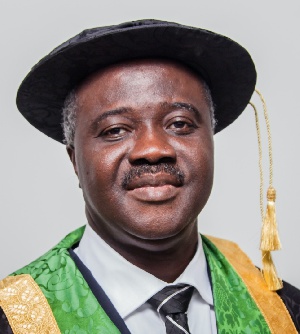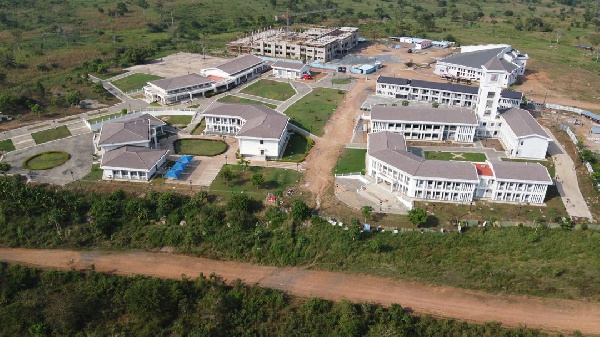 Vice Chancellor of UHAS, Prof John Gyapong
Vice Chancellor of UHAS, Prof John Gyapong
After six rigorous years of training, 41 medical doctors graduated from the University of Health and Allied Sciences (UHAS) Medical School last week, becoming the first in the University’s eight-year history.
At the same ceremony on Friday, November 6, 2020, some 30 medical biochemists and molecular biologists also graduated for the first time from the University.
The University has been training Physician Assistants since the inception of the Medical School, but last Friday was the first time Medical Doctors were graduated.
While the graduation event is a laudable achievement for academia and medical practice, the journey has not been smooth.
Speaking to GhanaWeb in an exclusive interview, Vice-Chancellor of UHAS, Prof John Gyapong, revealed that the hurdles started with upgrading the Volta Regional Hospital into the status of a Teaching Hospital.
“First of all, the Volta Regional Hospital in Ho needed to be upgraded to a Teaching Hospital, so we went through a lot of accreditation processes and worked very closely with the Medical and Dental Council to ensure that the minimum standards are put in place.
“Then the issue of attracting specialists to come from Accra or Kumasi – Korle Bu, Komfo Anokye, these big hospitals – and be resident in Ho was also a challenge,” he narrates.
He said some of the specialists that the school was aiming at recruiting failed to accept the offer from UHAS because Ho – the Volta Region capital and where the school is cited – lacks the kinds of social amenities they [specialists] are used to in big cities like Accra, Kumasi and Cape Coast.
"Ho is not a place where many people who have lived in Accra all their lives would choose to live when it comes amenities and infrastructure. The specialists all wanted to stay in Accra, Kumasi, Tema – the big cities – because of the amenities in these big cities,” he said.

Prof Gyapong, however, said the University found a way around this challenge.
“We got a few committed people and by the grace of God, these specialists decided to take the bull by the horn and they moved from Accra and Kumasi to Ho to train these doctors,” he said.
Prof Gyapong said the dedication and hard work of these specialists have yielded great results.
“When the external examiners came from Korle Bu, Komfo Anokye and Cape Coast to come and examine our students, they [students] excelled beyond their expectation,” he said.
The new doctors have since been sent to all parts of the country to begin their housemanship.
A major challenge for the medical school remains the availability of appropriate infrastructure befitting a teaching hospital, although the government has taken steps to assist.
Prof Gyapong is committed to making UHAS and the medical school first-rated and has, therefore, taken steps to tackle some of the challenges that stand in the way of recruiting high-calibre specialists.
“People want to live with their family and have access to the right kind of school for their children. Many of the doctors want to take their children to the best schools.
“So we have taken the step to build a very high-class basic school here at the University which will open in January. Some of those challenges will be addressed but they come with the general development of the region,” he stressed.
UHAS is also looking at partnering private companies to deal with the problem of lack of requisite equipment for the hospital.
“I have managed to convince two cardiothoracic doctors to leave the Cardio Centre in Korle Bu to come and work here in Ho, they have moved but they are not able to operate in the theatre here because the theatre is not equipped to the standard of doing heart surgery.
“We need about $2 million to have a fully equipped cardiothoracic centre here,” he said.
These notwithstanding, the future looks bright for UHAS, says Prof Gyapong. The medical school is looking at increasing the number of graduating medical students to 60.
“The doctors made in Ho are highly skilled and comparable to doctors trained anywhere in Ghana and for that matter anywhere in the world,” Prof Gyapong stressed.